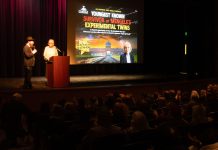GILROY
– City officials are calling the latest state budget compromise
an unfair money shifting scheme that could put a half-million
dollar dent in Gilroy coffers by 2004.
GILROY – City officials are calling the latest state budget compromise an unfair money shifting scheme that could put a half-million dollar dent in Gilroy coffers by 2004.
The state Assembly approved a compromise budget Tuesday that alleviates a record deficit by slashing spending, raising fees and relying on borrowing but still leaves the state facing a big deficit to solve next summer. In the package, which still must be signed by Gov. Gray Davis, is a rob-Peter-to-pay-Paul plan that will take half of the city’s sales tax share and supplant it with a greater portion of property tax revenues.
“Here we finally get some great sales tax retailers in town and the state comes in to syphon it off,” City Treasurer Mike Dorn said Wednesday morning after a cursory review of the complex budget plan.
Dorn said for fiscal 2003-04, Gilroy should not experience any net loss. But if the economy improves and as sales tax growth overtakes property tax growth each year, Gilroy will see $500,000 less each year. By 2005-06, the city estimates it will receive $1 million less than normal from sales tax.
Yearly sales tax growth is greater than property tax growth because Proposition 13 limits increases in property tax.
“I can’t figure out how any of this is going to help anyone because no new money is generated. They’re just switching things around,” City Administrator Jay Baksa said early Tuesday.
The budget deal approved in the house’s longest session in history avoids raising sales and income taxes, but counts on a $4 billion annual car tax increase that state officials triggered earlier this year and the elimination of a tax break for manufacturers.
After a marathon Assembly session of more than 27 hours, the budget bill passed 56-22 after Republicans – who had insisted on budget cuts – instead won an additional $300 million in spending to benefit local governments, law enforcement, schools and farmers.
The vote was enough to give the near-$100 billion proposal the two-thirds majority required to pass it. It now goes to Gov. Davis, who said that he will sign it this week.
“It’s not pretty but it could have been a whole lot uglier,” Davis said. “It is far from perfect but further delay was unacceptable.”
The budget trims the state’s record deficit that could have mushroomed to nearly $40 billion by next July, Davis said. Instead, the shortfall will be about $8 billion by next summer, a problem Davis said he will address by appointing a special task force of business and financial experts to make recommendations.
Davis said he wants to hear from the panel before deciding anything about whether the state needs higher taxes or spending cuts to close that $8 billion shortfall.
The proposed budget largely protects education funding for the next year. Public health and human service programs are also expected to be maintained at the same levels as last year.
The plan uses a complex tax swap that allows the state to borrow nearly $11 billion to help bridge the state’s revenue shortfall.
But because lawmakers could not agree on imposing deeper cuts or raising more revenue through taxes, they delayed for at least a year a decision on how to deal with a portion of the deficit that could reach $8 billion by next summer.
Speaker Herb Wesson, D-Culver City, apologized to Californians for failing to pass a budget sooner and said the compromise would cause heartache and hurt.
“This is a bittersweet moment for me. I’m glad we’ve climbed this mountain,” Wesson said. “But I’m very saddened by the millions of people we will affect by not moving forward on this budget on a balanced approach.”
Republican Leader Dave Cox claimed victory, saying his party was “able to get a budget that didn’t increase taxes for Californians. It was a victory for our side.”
That characterization was fine with Davis.
“Let them claim victory,” the governor said in a telephone interview with The Associated Press. “Clearly the Republicans’ footprint is all over this budget.”
Republicans were able to avoid taxes beyond the automatic increase in the vehicle license fee, but “there’s a price involved, and the price is drastically reduced services,” Davis said.
Because spending has far outpaced tax collections in a slumping economy over the past two years, officials forecast earlier this year that California taxpayers would face a $38.2 billion deficit by next July if aggressive steps were not taken.
Passage of the budget should ease Wall Street investor concerns but it’s not likely to change the state’s low credit rating. Last week Standard and Poor’s, one of the country’s most influential rating agencies, downgraded California’s debt to one notch above junk bond status.
Compromise over the budget came only a few days after an effort to recall Davis qualified for special election this fall.
The marathon session was extended by demands from Republicans to add about $250 million to state spending, including more money for schools and local law enforcement, and a repeal of a tax on milled farm products. Republicans got a grant to benefit rural police agencies and to continue the fight against illegal methamphetamine production.
Assemblyman Joe Nation, D-San Rafael, said it was ironic that Republicans would hold up approval of the budget for more spending after criticizing Democrats for overspending.
“I don’t think it is a responsible position,” Nation said. “It’s not realistic to assume that the Legislature can request additional programs without addressing the revenue side of things.”
The monthlong deadlock was caused by a disagreement between Democrats and Republicans over tax increases and spending cuts. The final vote received support from 45 Democrats and 11 Republicans. Two Assembly members, one from each party, were excused and did not vote. Two Democrats voted against the budget.
Democrats, who hold big majorities in both houses but need Republican help to muster a budget-approving two-thirds vote, wanted a half-cent sales tax to help close the budget gap. Republicans said the gap could be closed using existing revenues and deep cuts.
The Senate approved the budget compromise Sunday night and sent it to the Assembly, which took up the matter at noon Monday.
Negotiations continued through the night and Wesson said he would hold members on the floor as long as necessary, breaking a 26.5-hour continuous session record set in 1963.













